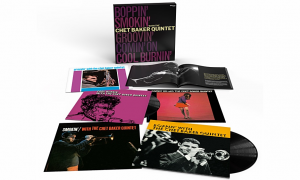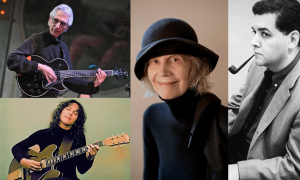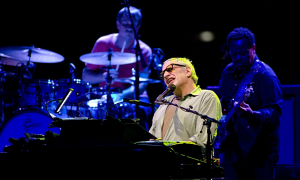Home » Jazz Articles » Highly Opinionated » Fusion: What's in a Name?
Fusion: What's in a Name?
When I was just starting out, playing guitar in bands as a kid, it was the Blues of Muddy Waters, Fred McDowell, Howlin' Wolf and then the Stones, Hendrix, Cream, Johnny Winter, Kinks, Clapton, The Who, Zepplin etc. A natural progression.
When I was about 18 I heard a record with Joe Pass and Herb Ellis on it doing guitar duets and everything changed. From then on music was a "serious" thing, not just a lot of fun. I found that music could do more than just satisfy good times with friends (and attract girls), it could make one think. It could address the intellect, the emotions, the physical and even the spiritual side. I can't say my tastes haven't changed since then but it was a turning point for me, aesthetically. From then on I searched for things displaying greater intellectual and technical prowess and the interplay of improvisation without forgoing feeling.
Discovering jazz caused a change in my entire direction in life. I ended up studying music not just playing it. It led me to Berklee in Boston and later to study with Charlie Banacos, an unsung master among musicians of the highest caliber. To even be in his presence is to know there are levels far beyond where you are and always will be. And in that was a comfort anytime we thought we could run out of things to practice! Ha!
Eventually, both sides once suitably developed, merged into a connected whole. Like the so-called "fusion" of jazz and rock, what I felt was the height of musical ability and expression was that displayed by those who were truly moved by the music of Hendix, Sly, James Brown, Bach, 'Trane, Otis Redding, Stevie Wonder, Miles, Monk, Cream, Zappa and all in between.
Somehow fusion became a termus non-grata. To be associated with fusion was to be less, not both, but neither jazz nor rock. At least not either done well or authentically. It took a while for this new connected form to grow up and to be accepted as something valid in its own right. It took an entire generation, some would say. In either case, that generation is now grown, and this is both a legit art form and an exciting subset of jazz and rock. One that may have actually saved and resurrected Jazz, as it was going at the time.
There is something to this in the current zeitgeist. I've seen this expressed by many artists including Joshua Redman who said growing up that he didn't classify or separate different styles in his record collection, but that the only types of music are that which moves you and that which doesn't. Some might say: good and bad. Bill Frisell has also voiced the same aesthetic in describing his musical evolution, as have many others. And as a result, their music is richer for it. The farther we can open our minds the more we can accept that is good about all pursuits. A filter is still helpful, even necessary for focusing on what's of the most value, especially when studying.
Those successful proponents of the merging of jazz and rock are now many and not surprisingly are littered with guitarists. Among others, they include Miles, Mike Stern, Pat Metheny, John Scofield, Bill Frisell, Pat Martino, John McLaughlin, Jaco, Chick Corea, Michael Brecker, John Medeski, Dave Weckl and many others. Some of these guys may have considered themselves purists at one time. This usually happens when we're studying to become something and we feel we have to be serious and focused. Other times it's merely a marketing thing. Some have never sought or needed to constrain themselves that way. Either way, we all have some great music to listen to as a result.
The thing is, is that doing this kind of music doesn't keep anyone from swinging as hard as any straight-ahead player. Or laying down funk like you were born to it. Or slammin' the blues or rock gigs like it was all that was in your blood. No, as a matter of fact the freedom we allow ourselves in being open to these different forms is what allows 'jazz' to breathe and what keeps it vital and from becoming merely a museum piece gathering dust. Jazz is surprise and excitement. It's the thing that makes us laugh when we recognize a quote within a brilliant solo as it goes by or a reference to another player, either by tone, line or technique. It's what rivets an audience when two players square of to cut each other (not that music is competition but it does happen). It's what keeps our interest in a 12-minute drum or bass solo (some folks still don't understand, and that's cool). And sometimes you just wanna hear a rock groove with straight eighths (or sixteenths) but also with the cerebral aspect connected in overdrive. That's cool. So is tearing down walls and expectations.
All fusion means is a melding of two or more musical styles. They can be ANY two, or more. People forget that, I think. So, whether you call it fusion or jazz/rock or just great, exciting music that keeps us surprised, interested and wanting more... or whether you won't let yourself listen to it at all, maybe because you feel its a mutt or poorbred music, just remember, Jazz in its purest form was once called the devil's music. And this was by the very African-American culture it came from! Jazz is itself a fusion... it came from blues and spirituals combined with European Art music. And these are still areas we look to for current inspiration to propel this music forward even now.
So, as music grows, so does our individual aesthetics, as they should. And so do we. Music and art have been said to reflect our times, and it does. On a more personal level, it also can reflect who we are.
Maybe we could all give it a rest and put some music on... whatever works for you.
Tags
Highly Opinionated
Mike Brannon
Joe Pass
Herb Ellis
Joshua Redman
Bill Frisell
John Scofield
Pat Martino
john mclaughlin
Chick Corea
Michael Brecker
John Medeski
Dave Weckl
Mike Stern
pat metheny
Miles Davis
Jaco Pastorius
PREVIOUS / NEXT
Support All About Jazz
 All About Jazz has been a pillar of jazz since 1995, championing it as an art form and, more importantly, supporting the musicians who make it. Our enduring commitment has made "AAJ" one of the most culturally important websites of its kind, read by hundreds of thousands of fans, musicians and industry figures every month.
All About Jazz has been a pillar of jazz since 1995, championing it as an art form and, more importantly, supporting the musicians who make it. Our enduring commitment has made "AAJ" one of the most culturally important websites of its kind, read by hundreds of thousands of fans, musicians and industry figures every month.























